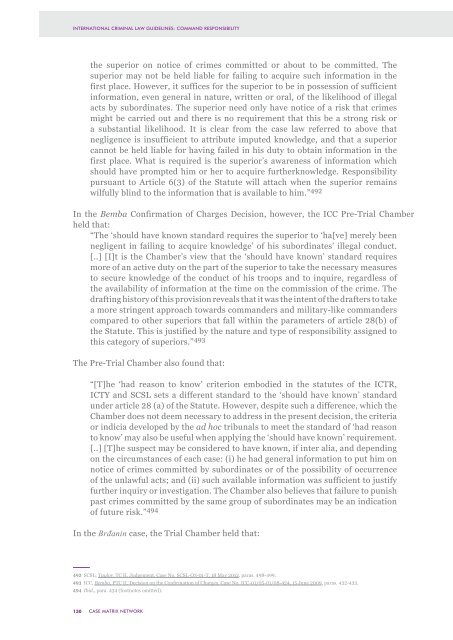Command Responsibility
CMN_ICL_Guidelines_Command_Responsibility_En
CMN_ICL_Guidelines_Command_Responsibility_En
Create successful ePaper yourself
Turn your PDF publications into a flip-book with our unique Google optimized e-Paper software.
INTERNATIONAL CRIMINAL LAW GUIDELINES: COMMAND RESPONSIBILITY<br />
the superior on notice of crimes committed or about to be committed. The<br />
superior may not be held liable for failing to acquire such information in the<br />
first place. However, it suffices for the superior to be in possession of sufficient<br />
information, even general in nature, written or oral, of the likelihood of illegal<br />
acts by subordinates. The superior need only have notice of a risk that crimes<br />
might be carried out and there is no requirement that this be a strong risk or<br />
a substantial likelihood. It is clear from the case law referred to above that<br />
negligence is insufficient to attribute imputed knowledge, and that a superior<br />
cannot be held liable for having failed in his duty to obtain information in the<br />
first place. What is required is the superior’s awareness of information which<br />
should have prompted him or her to acquire furtherknowledge. <strong>Responsibility</strong><br />
pursuant to Article 6(3) of the Statute will attach when the superior remains<br />
wilfully blind to the information that is available to him.” 492<br />
In the Bemba Confirmation of Charges Decision, however, the ICC Pre-Trial Chamber<br />
held that:<br />
“The ‘should have known standard requires the superior to ‘ha[ve] merely been<br />
negligent in failing to acquire knowledge’ of his subordinates’ illegal conduct.<br />
[..] [I]t is the Chamber’s view that the ‘should have known’ standard requires<br />
more of an active duty on the part of the superior to take the necessary measures<br />
to secure knowledge of the conduct of his troops and to inquire, regardless of<br />
the availability of information at the time on the commission of the crime. The<br />
drafting history of this provision reveals that it was the intent of the drafters to take<br />
a more stringent approach towards commanders and military-like commanders<br />
compared to other superiors that fall within the parameters of article 28(b) of<br />
the Statute. This is justified by the nature and type of responsibility assigned to<br />
this category of superiors.” 493<br />
The Pre-Trial Chamber also found that:<br />
“[T]he ‘had reason to know’ criterion embodied in the statutes of the ICTR,<br />
ICTY and SCSL sets a different standard to the ‘should have known’ standard<br />
under article 28 (a) of the Statute. However, despite such a difference, which the<br />
Chamber does not deem necessary to address in the present decision, the criteria<br />
or indicia developed by the ad hoc tribunals to meet the standard of ‘had reason<br />
to know’ may also be useful when applying the ‘should have known’ requirement.<br />
[..] [T]he suspect may be considered to have known, if inter alia, and depending<br />
on the circumstances of each case: (i) he had general information to put him on<br />
notice of crimes committed by subordinates or of the possibility of occurrence<br />
of the unlawful acts; and (ii) such available information was sufficient to justify<br />
further inquiry or investigation. The Chamber also believes that failure to punish<br />
past crimes committed by the same group of subordinates may be an indication<br />
of future risk.” 494<br />
In the Brđanin case, the Trial Chamber held that:<br />
492 SCSL, Taylor, TC II, Judgement, Case No. SCSL-O3-01-T, 18 May 2012, paras. 498-499.<br />
493 ICC, Bemba, PTC II, Decision on the Confirmation of Charges, Case No. ICC-01/05-01/08-424, 15 June 2009, paras. 432-433.<br />
494 Ibid., para. 434 (footnotes omitted).<br />
130<br />
CASE MATRIX NETWORK


